
Space Ballroom Weekly Round-Up: 6 shows announced, including Tropidelic returns to Connecticut
Space Ballroom announced Steve Gunn, Boyscott with Raavi, Lily Konigsberg, Mondo Cozmo w/ Jane Leo, Cursive w/ Gladie and Tropidelic w/ Kash’d Out, Quasi Kings. Tickets are on sale now via spaceballroom.com
Steve Gunn
Space Ballroom • 295 Treadwell Street, Hamden, CT 06514
September 26, 2024
Click here to purchase tickets
Steve Gunn
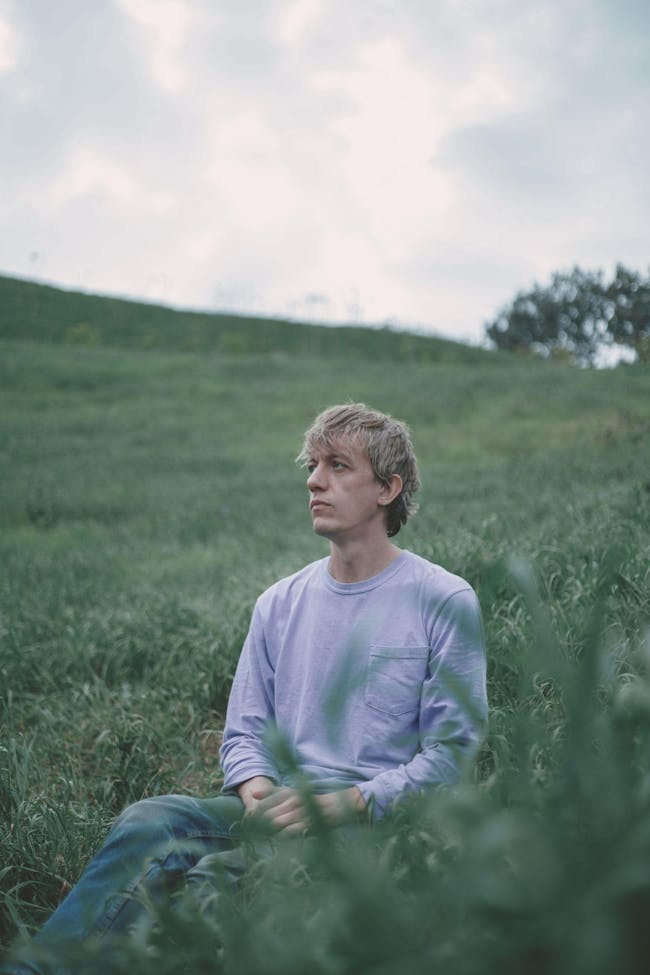
Steve Gunn is a New York-based guitarist and songwriter. With a career spanning nearly fifteen years, Steve has produced volumes of critically acclaimed solo, duo, and ensemble recordings on labels such as Matador Records, Three Lobed Recordings, Paradise of Bachelors, and RVNG. His albums represent milestones of contemporary guitar-driven material, and forward thinking songwriting. Steve has steadily processed his inspirations into a singular, virtuosic stream. Close listening reveals the influence of blues, folk, ecstatic free jazz, and psych in his continually unfolding output. His most recent record Let the Moon Be a Planet (RVNG Intl.), a collaboration with pianist David Moore of Bing & Ruth, was released in March. Steve is currently somewhere working on new music.
Boyscott w/ Raavi, Lily Konigsberg
Space Ballroom • 295 Treadwell Street, Hamden, CT 06514
October 12, 2024
Click here to purchase tickets
Boyscott
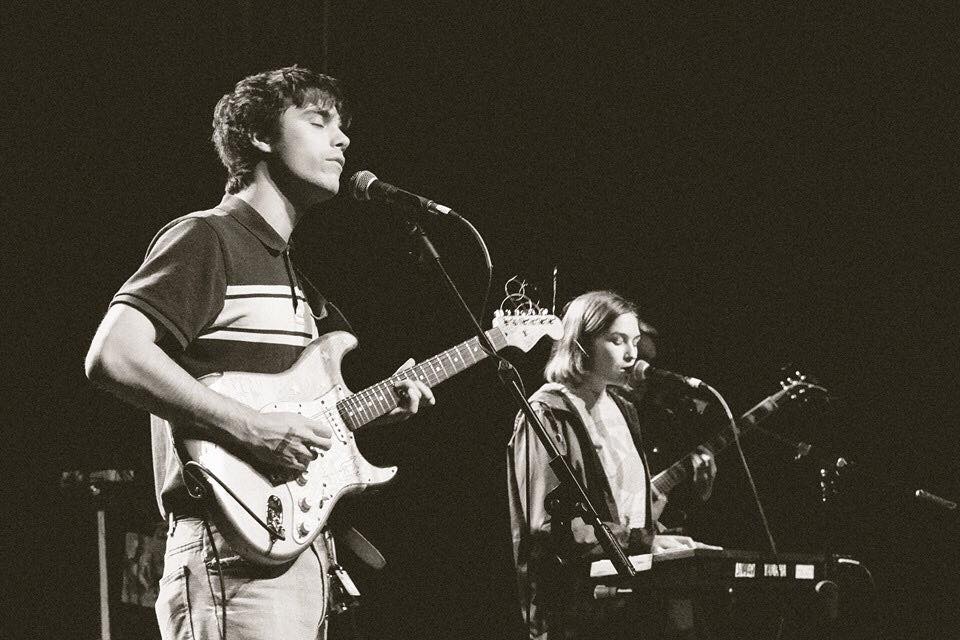
Punctuating wistful, daydreamy indie rock with surfy guitar hooks, Boyscott took shape in college dorm rooms and grew into a fully formed band. The loose collective that made up the project completed their whimsically drawn 2015 debut Goose Bumps before ever playing live.
Boyscott began in 2015 as an outlet for singer/songwriter Scott Hermo’s recording experiments while he was attending college in Nashville. Hermo recorded in his dorm room and sometimes enlisted friends to help flesh out his light and breezy indie tunes. Fellow schoolmates and musicians Emma Willer, Tiger Adams, John Lewandowski and Noah Miller joined him to bring a live energy to Hermo’s recordings and together, the five musicians completed debut album Goose Bumps and self-released it in late 2015. When Boyscott began playing live, school commitments kept a solid lineup from forming, but Hermo enlisted a rotating cast of friends and musicians to play shows and go on tours. The band’s acclaim grew organically through consistent touring and their album, which caught on in a grassroots fashion. A physical release of Goose Bumps arrived in 2019 as a joint release from Top Shelf Records and Babe City Records.
Raavi
Lily Konigsberg
Lily Konigsberg wrote “Sweat Forever,” one of the singles from her forthcoming full-length album, Lily We Need to Talk Now, in the heat of a moment when her life felt upside down and a longtime relationship was ending. “I’m still here / Is that what you wanted?” she sings, with light and clarity that belies the true sadness of that sticky refrain. The song is propelled by the feathery strum of a 12-string guitar (one gifted to her while she was working at the Gym, a Brooklyn mutual-aid hub), her playful vocal asides, and crisp, detail-oriented production by Nate Amos (Water From Your Eyes, My Idea).
Lily We Need to Talk Now is a record Konigsberg has been slowly chipping away at since 2016, revising and re-recording the songs over the years. The eleven-track collection is her first proper full-length, following her anthology of EPs and unreleased tracks, The Best of Lily Konigsberg Right Now, released in 2021 by Wharf Cat Records. The new record is catchy the whole way through, like much of the poppy and plainspoken indie rock output that’s made her a fixture of the NYC underground in recent years. Her voice twists and turns and dashes around her clever wordplay in new ways here; there are hints of power pop, pop punk, and downtempo introspection, all dotted with easter eggs of winking humor. She’s joined by many of her longtime collaborators: Andrea Schavelli, with whom she released the 2017 split Good Time Now; Matt Norman, with whom she has collaborated in the avant-pop duo Lily and Horn Horse for years; Paco Cathcart, of the Cradle, who produced her 2020 EP It’s Just Like All the Clouds; and Nina Ryser, with whom she plays in the acclaimed art-punk trio Palberta. But it’s her collaboration with Amos that makes the most notable new additions.
True to its title (taken from a text message sent to Konigsberg by Amos), this collection of songs is like a check-in with herself. On “That’s the Way I Like It,” with backing vocals from Cathcart, Konigsberg reflects on the feeling of struggling with a loved one. “You can get all evil about it—like a brat, like a baby,” she says. On “Proud Home,” she sings one of the record’s boldest earworm hooks (“You’ve got a lot of fucking things to be proud of!”) and tries to comfort a friend who has a crush on her mom. “I really cracked myself up with the lyrics,” she says. “It’s kind of a ‘Stacy’s Mom’ riff. I decided it’s a dedication to Adam Schlesinger [of Fountains of Wayne].” But Konigsberg’s lyrics aren’t happy all of the time. “There’s a lot of sadness or strangeness in them,” she says. “This album is clearly about breaking up with somebody that I love. But, in all of my music, there’s humor. I don’t take myself too seriously.”
Konigsberg’s sense of humor is on display in “Hark,” an infectious and light-hearted track about the frustrations of songwriting. It was originally written for her quarantine project with Palberta bandmate Ani Ivry-Block, Forever. “I hate the fact that I belong to something that needs my help or else it will die,” she sings gracefully about her unfinished tunes, before joking, “You can look, but don’t touch / That part’s a mess / Leave it to me,” backed by a bouncy bassline and horns, her voice occasionally wrapped in a touch of autotune. “It’s an odd song but weirdly catchy,” she says. “My musical life is kind of encapsulated in it.”
Konigsberg has been writing songs all her life. Born and raised in Brooklyn, she started playing solo sets around NYC clubs as a teenager, before linking up with Bard classmates Ryser and Ivry-Block to form Palberta. “They’re the reason that I’m such a confident performer,” Konigsberg says about her Palberta bandmates. “We learned to perform together, and now I’m genuinely not scared when I go onstage. They’re my sisters, and they inspire me to just do me.” Despite this being her namesake project, Konigsberg’s biggest influences remain her friends and collaborators, and the project generally has the feeling of a collective effort. “I just love all of my friends, and I’m really happy that some of them are part of the record. Charlie, Hugo, Nina, Paco, Andrea, Matt, Nate. They inspire me a lot.”
Lily We Need to Talk Now explores the rollercoaster of grief that accompanies a heartbreak—and the rush of exciting things that come next. The album ends aptly with “True,” a cathartic, high-energy rocker that Konigsberg says captures “the feeling that you can’t live without someone—but you can.” She compares the end of a relationship to a death. “You can’t imagine someone in your life not being there, and then they’re not there. And sometimes you’re happy and laughing, and sometimes you’re mourning. But life does go on.”
Mondo Cozmo w/ Jane Leo
Space Ballroom • 295 Treadwell Street, Hamden, CT 06514
October 23, 2024
Click here to purchase tickets
Mondo Cozmo
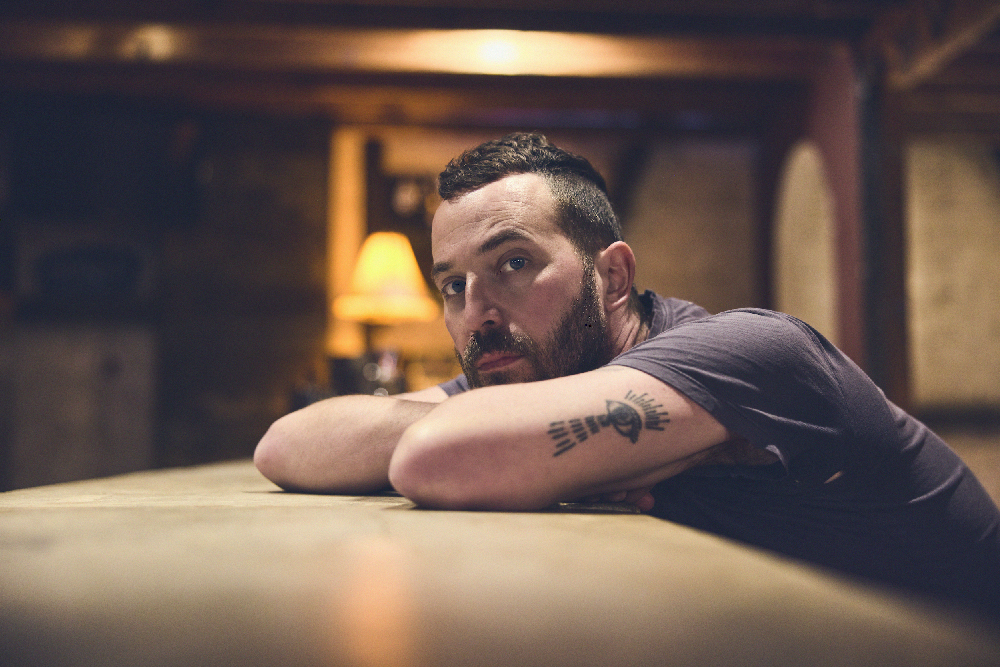
Mondo Cozmo’s Josh Ostrander understands what happens when the heart cracks in two—and what to do next. That empathic ability drew him intrinsically to the Barbarian poets, a group of writers who gathered in San Francisco’s Cafe Babar in the 1980s. Crammed into a tiny back room, poets like David Lerner would roar out their latest works amidst an equal flurry of riotous applause and smashed pint glasses. When Ostrander first came across Lerner’s poetry, it was the energy, the fervor, and the passion that grabbed him. Reeling from loss in his family, mired in pandemic, and searching for hope, Ostrander connected immediately to the dedication in one of Lerner’s books, knowing he’d found the title of his next album. This Is For the Barbarians (due April 8th via Last Gang Records) recognizes that death and life can be celebrated synchronically, pulling the darkness in to find the light inside, discovering grandeur in life’s most intimate moments. “It’s bright and funny, the human experience in a year of isolation,” Ostrander says. “It’s a slice of my liver and a piece of my heart. This is for the people going through darkness like I’ve been going through. Is anybody else out there hurting, or mad, or scared out of their mind? We’re in this together.”
Mondo Cozmo built up his audience—his tribe of Cozmo-nauts—through his first two records, songs that sit at some sublime and surreal convergence of folk poetry and acoustics, heady electronics, and anthemic rock hooks. His 2017 debut, Plastic Soul, earned loving reviews everywhere from Entertainment Weekly to The Guardian, catapulting Mondo Cozmo onto stages with the likes of Spoon and Muse. His sophomore record, 2019’s New Medicine, amped up the punk urgency, thanks in part to collaborations with members of Black Rebel Motorcycle Club and guidance from the legendary Butch Vig.
But when it came time to tour that record, the pandemic canceled Ostrander’s entire plans for the year, and the Philadelphia-born musician found himself moving from Los Angeles to the small town of Twin Peaks, California. And instead of bringing music to crowds around the world, he would regularly drive three hours to visit his beloved uncle. “He had a houseboat, and we would go out on the boat and listen to Bruce Springsteen and Bob Seger,” Ostrander recalls fondly. Tragically, Ostrander’s uncle was diagnosed with cancer, making those long drives and heartfelt visits prior to his passing all the more meaningful. “I was commuting back and forth, all those trips, trying to write songs, listening to instrumentals I was working on and trying to write lyrics,” Ostrander adds.
From the opening roar and jangle of lead single “Feel Good” forward, it’s clear that instead of focusing on suffering, Ostrander honed in on the love, connection, and beauty that surrounds it. Backed by cowbell, layered horns, and sampled shouts, Ostrander lets fly a blaring distorted guitar solo, inviting the listener to commune amongst the ruin. The explosive “Meant For Livin’” similarly feels like an anthem for those just scraping through the pandemic, the twitchy energy and wall of sound horns parting just enough for Ostrander to offer a simple plea: “Here’s hoping that you get out alive.” Album opener “Electrify My Love” similarly centers on hope for the post-pandemic world, pulling inspiration from OK Computer’s mesh of electronic burble and guitar grind. And as Ostrander reaches a vibrant apex, he’s joined by a choir of backing vocals, the world unifying. “I felt a need to check in on everyone, to hope the record finds them well,” he says. “We all need a reset, to put that care first.”
No artist has achieved that anthemic focus on empathy and uplift as well as Bruce Springsteen, and Ostrander slots the elegiac “Eyes of Love” proudly into that tradition. The song crests on rapturous waves of guitar and piano, Ostrander wishing he could tell off the gods for what they’ve done. In fact, not long after recording the track, The Boss himself mentioned in an interview that he’d started getting into Mondo Cozmo’s first two albums. “Growing up, Springsteen was like gospel. It was unbelievable,” Ostrander says. “I wrote him a letter about how I wasn’t sure I was doing the right thing, but how much I appreciated him listening to the music, not expecting a response, but he wrote back. The boss was literally like, ‘You’re doing the right thing. Just keep doing it!’” As if that iconic connection weren’t enough, another song on This Is For the Barbarians called for another letter to be written, this time to Bob Dylan.
“Dylan had been my very first concert as a kid, and I’ve always loved his music. So when I wrote ‘Good Mornin’ America’ for this record, I just kept referencing him in the lyrics,” Ostrander says. The jammed-to-the-gills track rides its marching beat through anxieties about the pandemic, the injustice of the murder of George Floyd, the January 6th insurrection, and other national wounds—Ostrander marveling at the irony that the people being offered “shelter from the storm” in this midst were the unjust. Whether it’s Dylan, Radiohead, the Stone Roses, or Spiritualized, he draws inspiration from the things that he loves and makes it his own.
For an album threaded through by concerns of a darkening world and focused on the loss of a loved one, Ostrander’s fervent love and the joy of music makes This Is For the Barbarians a revelatory, redemptive whirlwind, a mosaic of indie rock power. And as the album closes on the gospel sway of “Lord”, the full weight of hope comes to bear. “I needed to close with that song. It’s a joyful release, a celebration of life and moving on,” Ostrander says. “That’s how I want to remember life, that happiness is within our reach, even when the world feels broken.”
Emma Ruth Rundle w/ Ora Cogan
Space Ballroom • 295 Treadwell Street, Hamden, CT 06514
November 2, 2024
Click here to purchase tickets
Emma Ruth Rundle
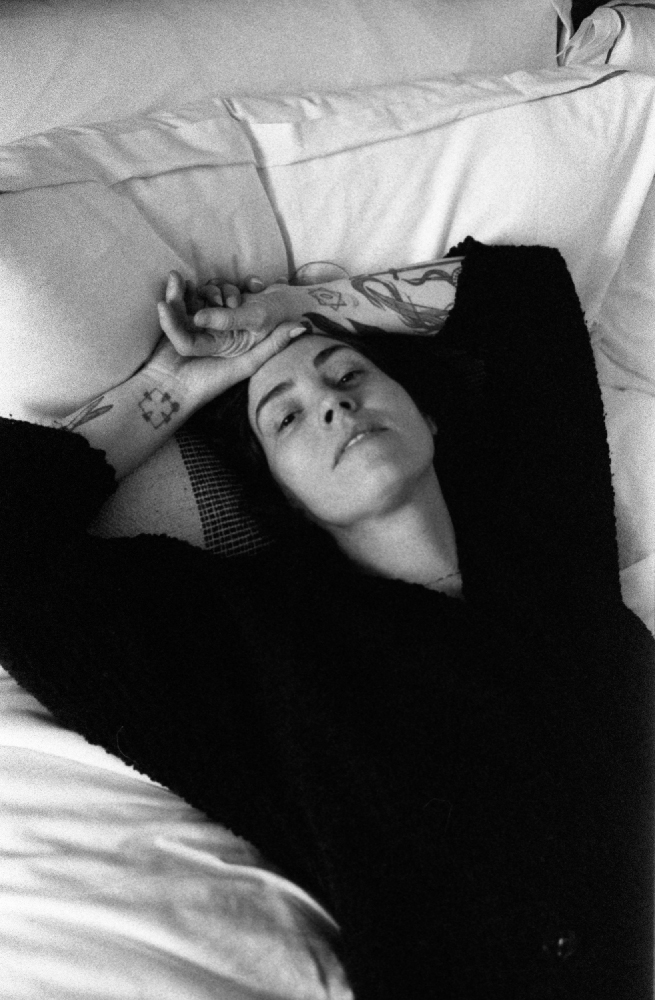
“I don’t know what to reveal about this album,” Emma Ruth Rundle responds when pressed to talk about her latest record, the stark, intimate, and unflinching Engine of Hell. “I feel like I want to be left alone for a little bit… it doesn’t feel like it’s time to wave the ‘look at me’ flag.” It’s an understandable position given the heavy lyrical content of the record and the naked and exposed nature of the accompanying music. Even the most cursory listen of the album is sure to elicit some questions. Rundle has opted to forego the full-band arrangements of her last two albums—Marked For Death and On Dark Horses—in favor of the austerity of a lone piano or guitar and her voice, putting every word under the microscope. Engine of Hell was recorded almost entirely live with minimal overdubs, and the effect is an extremely up-close and personal confessional with an ASMR-level focus on the rich subtleties and timbre of Rundle’s graceful performances. Much like Nick Drake’s Pink Moon or Sibylle Baier’s Colour Green, Engine of Hell captures a moment where a masterful songwriter strips away all flourishes and embellishments in order to make every note and word hit with maximum impact. But it’s also a record that leaves little to hide behind.
Emma Ruth Rundle has always been a multifaceted musician, equally capable of dreamy abstraction (as heard on her debut album Electric Guitar: One), maximalist textural explorations, and the classic acoustic guitar singer-songwriter tradition (exemplified by Some Heavy Ocean). But on Engine of Hell, Rundle focuses on an instrument that she left behind in her early twenties when she began playing in bands: the piano. In combination with her voice, the piano playing on Engine of Hell creates a kind of intimacy, as if we’re sitting beside Rundle on the bench, or perhaps even playing the songs ourselves. “I really wanted to capture imperfection and the vulnerability of my humanity,” Rundle says of the album’s sonic approach. “In some small way, there is this tiny punk rock feel of ‘well, fuck this perfect, polished, produced, and rehearsed thing that we are so pressured to do. Here are some very personal songs; here are my memories; here is me teetering on the very edge of sanity dipping my toe into the outer reaches of space and I’m taking you with me and it’s very fucked up and imperfect.’”
The instrument of Rundle’s childhood is the perfect vehicle for an album that is essentially a collection of memories from her youth, though one doesn’t need to dig too deep to realize Engine of Hell isn’t some saccharin nostalgia trip. A gentle melancholy piano line introduces album opener “Return,” and when Rundle finally sings, every syllable guided with the utmost intention, she unleashes the ominously cryptic opening lines “A rich belief that no one sees you / Your ribbon cut from all the fates and / Some hound of Hell looking for handouts / The breath between things no one says.” The ambiguity may obscure the muse, but it doesn’t diminish its heaviness. However, as the album progresses, it becomes apparent that Engine of Hell is more memoir than pure poetry. By the next song—the soft-spoken acoustic guitar ballad “Blooms of Oblivion”—we’ve been given more explicit details. “Down at the methadone clinic we waited / hoping to take home your cure / The curdling cowards, the crackle of china / you say that it’s making you pure.” It gets even heavier on Engine of Hell’s third song “Body,” where Rundle recounts a childhood memory of seeing a deceased family member wheeled away by strangers.
The memories and their accompanying songs aren’t always steeped in grief. “Dancing Man” is one of the most delicate and somber songs on the album, with its sleepy cadence and hushed delivery giving it a distinctly dream-like quality. Yet the song serves a positive purpose: it chronicles a cherished memory of Rundle dancing with a friend—an experience she returns to in dark moments when she needs the reminder of “perfect days with this perfect love that exists in a space which can never be taken away from me, can never be ruined, can never be changed.”
Engine of Hell’s definitive statement comes with the final song “In My Afterlife.” The verses find Rundle singing about passing on against a drape of sparsely arranged minor chords on the piano. But the somber tone turns redemptive on the choruses, where the melody shifts to a major key, and Rundle seems to bask in the possibilities of coming untethered to the past. “I’ve been living in a state of dissociation for so long,” Rundle reflects, “and that’s what gave birth to this particular song. Once all the songs for the album were done I realized ‘In My Afterlife’ was what the album is actually about. For me this album is the end of an era to the end of a decade of making records. Things DO have to change and have changed for me since I finished recording it.” In essence, Engine of Hell signifies a major turning point for Emma Ruth Rundle as both an artist and as a person. The catharsis of this type of songwriting has effectively served its purpose, and to continue ruminating on the past going forward is less of a healing process and more like picking at a scab and refusing to let it heal. This may help explain why Rundle is less than enthusiastic about divulging the details about her muses, but it doesn’t alter the fact that these songs served a purpose in their creation, and that they may continue to bring comfort to others.
Engine of Hell is a potent album, and it may prove too emotionally overwhelming for fans of a more anodyne brand of songwriting. But for anyone that’s endured trauma and grief, there’s a beautiful solace in hearing Emma Ruth Rundle articulate and humanize that particular type of pain not only with her words, but with that particular mysterious language of melody and timbre.
Ora Cogan
Formless finds beauty, absurdity, humour, and unlikely joy in the bleakest of times. Cogan’s smoky, psychedelic approach to gothic country and hazy folk merges with post-punk, groove, psych rock, and traditional balladry. With a singular voice as much sensation as sound, Ora Cogan seeks out new realities within the smoke-and-mirrors labyrinth of our cruel society.
“Writing this album was a very much a lifeline… transformative and healing,” Cogan recalled. “Re-calibrating an internal compass constantly thrown off by the magnetism of a deranged world.”
Recorded in mostly off-the-floor takes with rhythm section David Proctor and Finn Smith on analog tape at Vancouver Island’s Risque Disque studio and co-produced by Cogan and Loving’s David Parry, Formless features international guest stars including Cormac Mac Diarmada from LANKUM, who plays strings on “Feel Life,” and a duet with Y La Bamba on “Ways of Losing.”
Raised by a photojournalist and a musician on the islands of Canada’s Pacific coast, Cogan shaped her approach to music far from big-city scenes. Her childhood home played host to a constant stream of artists as it served as a professional recording studio. Cogan absorbed a myriad of influences growing up, from Ladino and Rumbetico to American country blues and outsider art all feeding into her glacial and cinematic yet tinglingly intimate sound.
Cogan has been crafting critically acclaimed records for years, earning her festival slots throughout Europe and North America, residencies in Italy and France, and shows with Mazzy Star and Grouper. Prolific and experimental, she’s collaborated with the likes of Frazey Ford, Skeena Reece and members of Big Brave.
Formless took form in the abyss of grief and pandemic isolation. “I spent a lot of time wandering aimlessly in the woods with my dog,” said Cogan. The result is an outpouring of ruminations on awkward love, pain, internal struggles, and a fight to find ways to feel good when everything goes bad.
Cogan and her close-knit band will support Formless with stateside touring as well as EU and UK dates in 2024. Her performances offer a vital antidote to the dystopian alienation of modern life, drawing overlapping audiences of folk, goth, pop, experimental, and even noise and punk fans together like some bizarre sonic/social Venn diagram.
Cursive w/ Gladie
Space Ballroom • 295 Treadwell Street, Hamden, CT 06514
November 4, 2024
Click here to purchase tickets
Cursive
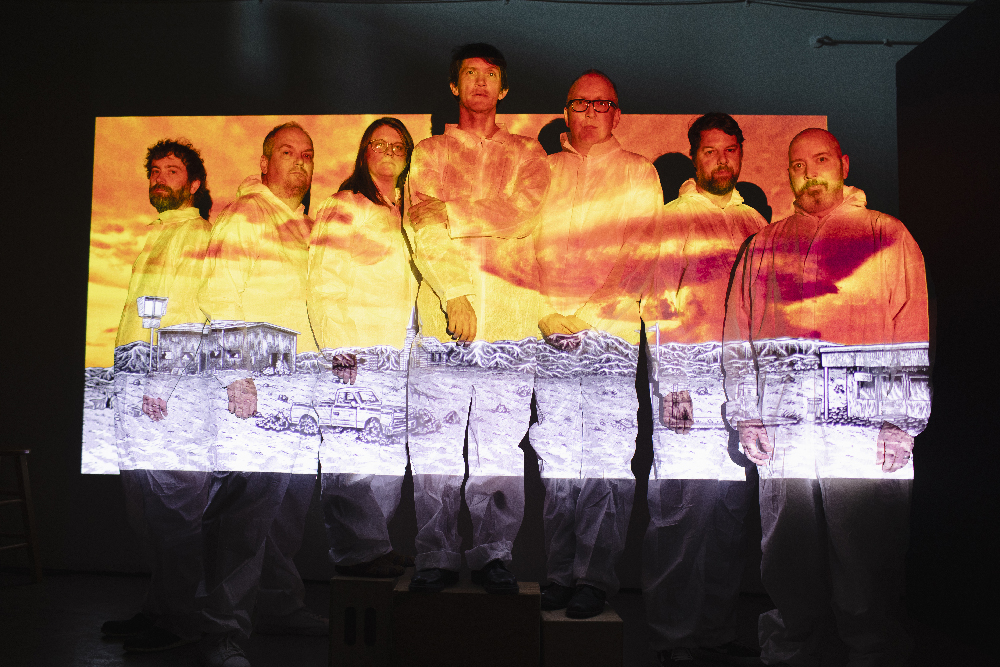
Over the past two decades, Cursive has become known for writing smart, tightly woven concept albums where frontman Tim Kasher turns his unflinching gaze on specific, oftentimes challenging themes, and examines them with an incisively brutal honesty. 2000’s Domestica dealt with divorce; 2003’s The Ugly Organ tackled art, sex, and relationships; 2006’s Happy Hollow skewered organized religion; 2009’s Mama, I’m Swollen grappled with the human condition and social morality; and 2012’s I Am Gemini explored the battle between good and evil. But the band’s remarkable eighth full-length, Vitriola, required a different approach — one less rigidly themed and more responsive as the band struggles with existentialism veering towards nihilism and despair; the ways in which society, much like a writer, creates and destroys; and an oncoming dystopia that feels eerily near at hand.
Cursive has naturally developed a pattern of releasing new music every three years, creating records not out of obligation, but need, with the mindset that each record could potentially be their last. 2015 came and went, however, and the band remained silent for their longest period to date. But the members of Cursive have remained busy with solo records, a movie (the Kasher-penned and directed No Resolution), and running businesses (the band collectively owns and operates hometown Omaha’s mainstay bar/venue, O’Leaver’s). The band even launched their own label, 15 Passenger, through which they’re steadily reissuing their remastered back catalogue, as well as new albums by Kasher, Campdogzz, and David Bazan and Sean Lane. And like many others, the band members have been caught up in the inescapable state of confusion and instability that plagues their home country, and seems to grow more chaotic with each passing day.
Which brings us to 2018 and Vitriola. For the first time since Happy Hollow, the album reunites Kasher, guitarist/singer Ted Stevens and bassist Matt Maginn with founding drummer Clint Schnase, as well as co-producer Mike Mogis (Bright Eyes, M. Ward, Jenny Lewis) at ARC Studios in Omaha. They’re joined by Patrick Newbery on keys (who’s been a full-time member for years) and touring mainstay Megan Siebe on cello. Schnase and Maginn are in rare form, picking up right where they left off with a rhythmic lockstep of viscera-vibrating bass and toms, providing a foundation for Kasher and Stevens’ intertwining guitars and Newbery and Siebe’s cinematic flourishes. The album runs the sonic gamut between rich, resonant melodicism, Hitchcockian anxiety, and explosive catharsis — and no Cursive album would be complete without scream-along melodies and lyrics that, upon reflection, make for unlikely anthems.
There’s a palpable unease that wells beneath Vitriola’s simmering requiems and fist-shakers. Fiery opener “Free To Be or Not To Be You and Me” reflects the album’s core: a search for meaning that keeps coming up empty, and finding the will to keep going despite the fear of a dark future. The album directs frustration and anger at not only modern society and the universe at large, but also inward towards ourselves. On “Under the Rainbow,” disquiet boils into rage that indicts the complacency of the privileged classes; “Ghost Writer” has a catchy pulse that belies Kasher chastising himself for writing about writing; and “Noble Soldier/Dystopian Lament” is a haunting look at potential societal collapse that provides little in the way of hope but balances beauty and horror on the head of a pin.
Vitriola raises a stark question: is this it? Is everything simply broken, leaving us hopeless and nihilistic? Maybe not. There can be reassurance in commiseration, and the album is deeply relatable: Cursive may not be offering the answers, but there is hope in knowing you’re not alone in the chaos.
Gladie
Don’t Know What You’re In Until You’re Out, the second full-length record from Philadelphia band Gladie, opens with a contemplative instrumental called “Purple Year.” Along with acoustic strumming and a late-night wall of cricket-chirps, cello and gentle horn runs set a dewy, moonlit stage before second track and single “Born Yesterday” bursts alive with drums, bass, and bright guitar chord crunch. It’s like a cold, heart-jolting morning plunge as Augusta Koch’s familiar Philly tenor starts in: “It takes me more time, I’m a little unsteady/I was born yesterday, I forgot I could be somebody.”Koch realized while writing these songs that she had become an entirely different person: a mental, spiritual, and physical renaissance had unfolded over several years that, together, constituted an entirely new reality. Everything had changed, from relationships with friends to relationships with alcohol. Being on the other side of these tectonic shifts offered the sort of clarity that you can only get by going through the darkness: You Don’t Know What You’re In Until You’re Out. It’s optimistic, but it’s scary, too—life changes always are. Who will you be at the end of them? “Born Yesterday,” which Koch wrote about not drinking alcohol anymore, offers a critical revelation that guides the record, and which was hard-earned while experiencing the overwhelming emotional acuity that developed while living without alcohol: “The way I feel, I could fill the ocean/When the wave comes crashing in, it said I’m not a fixed thing/I’m changeable.”
“I like the idea that the record’s title can be both a positive and a negative,” says Koch. “It could seem sad, but it can also be hopeful in the sense that when you’re going through something really rough. It will get better, you will change, you will survive it, and you will be able to see it from a different perspective that you never thought you could.”Don’t Know What You’re In Until You’re Out cycles through these transitions sonically and thematically. “Hit The Ground” is a folksy, desert-drive shuffle, while “Nothing,” opening with feedback screech, is a punk-rock rollercoaster ride that rejects the American cultural drive to want more and more and more until we die: “What would it feel like to want nothing?” cries Koch.“Soda” tells a shoegazey, indie-psych love story that imagines creating our own normal when we’re around the people that make us feel seen, rejecting societal pressure to hate ourselves and feel like we’re not enough: “I like the way we live in tandem and the world we wish to see/Sweet and cheap, we thrive on less,” Koch sings on the second verse. The gentle alt-rock waltz of “Smoking” reflects on a deeply missed habit, and pensive, spacey, synth-and-cello-centric closer “Something Fragile” ends the record with as many questions as it started: “Am I something fragile or something strong?” Koch wonders, still finding her footing in strange new realities.
Don’t Know What You’re In Until You’re Out marks the first Gladie production with a set band lineup, a feature which was previously hampered by the pandemic. As a result, the LP leans into Gladie’s live energy and dynamics, moving away from the home-recorded keys and drum machines of their 2020 debut Safe Sins.Koch recorded Don’t Know What You’re In Until You’re Out at The Bunk in early 2022 with Matt Schimelfenig (guitar, keyboard, vocals), Pat Conaboy (guitar), Dennis Mishko (bass), and Miles Ziskind (drums). Schimelfenig also recorded and mixed the record, while Ryan Schwabe mastered. Mark Glick (cello), Mike Park (saxophone), and Brian Lockerm (trumpet) guest across four tracks.
Don’t Know What You’re In Until You’re Out will be released on November 18th on Plum Records, the label Koch started with former Cayetana bandmates Kelly Olsen and Allegra Anka.
Tropidelic w/ Kash’d Out, Quasi Kings
Space Ballroom • 295 Treadwell Street, Hamden, CT 06514
November 13, 2024
Click here to purchase tickets
Tropidelic

Tropidelic opened for The Dirty Heads last summer you can read our review here.
A musical lighthouse, shining a resilient light for everyone that has had to pull themselves up by their bootstraps, Tropidelic has arrived on the national stage. Hailing from Cleveland, Ohio, a city rich in character and music history, this six-piece performance powerhouse carves their own path with an independent mentality. Front man Roads, explores feelings more than sounds, seeing where the emotional travel can take him, while valuing being comfortable and honest.
There is a sense of seeing where the music can go on their 2024 new album. As an everyman-band making music to overcome life’s obstacles, the “goals” that Tropidelic made when starting the band have all been surpassed. Roads says of the band’s future, “I’m nose to the grindstone. It’s going great and I am going to keep going.”
The past year has included a first pitch at a Cleveland Guardians game followed by a live performance for the entire stadium; an adopted highway in their hometown; producing two of their own festivals (Sunny Days and Everwild Music Festival); tens of millions of streams of Tropidelic’s music; appearances at major US festivals such as Beach Life and Tortuga; tours with The Dirty Heads, Lupe Fiasco, 311, and Michael Franti; and their first performance at Red Rocks Amphitheatre.
Kash’d Out
Florida based Reggae/Rock band Kash’d Out have been hustlin’ hard since the beginning. After founders Greg Shields (lead vocals) and Jackson Hauserman (guitar) met in a studio session, it wasn’t long before Kash’d Out’s clever lyrics and tasteful guitar riffs were complimented by the unique bass lines of Joey Brohawn, and rhythmic precision of drummer Marshall Hearne.
Kash’d Out quickly caught the attention of Hawaiian favorites Pepper, who signed the band to their label LAW Records and released “The Hookup” – Kash’d Out’s first full-length album. Prior to its release, KO hit the road with Pepper and Less Than Jake, which helped the album climb the Billboard Reggae Charts. Since then, Kash’d Out has been no stranger to the open road. Storming the nation with an abundance of full U.S. tours under their belt, KO has supported genre heavyweights such as Collie Buddz, The Expendables, Iration and headlined multiple US tours of their own. The band’s drive and passion has landed them in the line up of Reggae’s most esteemed festivals such as Reggae Rise Up Florida/Utah/Maryland, California Roots, Dry Diggings and One Love.
Kash’d Out’s most recent album, “Butter” displays their diversity and mission into their own music path. The band has remained steadfast to originality, yet continues to evolve, revealing different sides to their sound.
The Quasi Kings
Formed in Columbus, OH in the Spring of 2016, the The Quasi Kings have quickly “cemented [their] place as the sprawling, multi-instrumental next generation of Columbus reggae.” (Columbus Dispatch). The band, led by brothers Zach (vocals, saxophone, percussion) & Benny Coleman (vocals, bass), varies in age, musical backgrounds, and taste, leading to a worldly & distinctive collage. Their premier offering, 2013’s Throwaway Culture EP, features catchy hooks, tight vocal harmonies, and a unique blend of reggae, rock, and hip-hop. Their latest album, Eye of the Storm, takes things a step further with songs like “Booze”, a raucous Sabbath inspired tune, and the dubby, horn driven “Cut It Out”. Their live shows are high energy, captivating and ever-evolving. The Quasi Kings have had the privilege to play with the likes of Steel Pulse, Badfish, Fortunate Youth, Passafire, The Expanders, Third World, Israel Vibration, Giant Panda Guerilla Dub Squad, The Werks, Dark Star Orchestra, Tropidelic, and more. Visit thequasikings.com for tour dates & more info.
Share your Space Ballroom experiences with us by using #findingconnecticut on Instagram
Click here for more information on Space Ballroom
Click here for the upcoming concerts in Connecticut
Click here for the latest news at Space Ballroom
Click here for the upcoming events at Space Ballroom
Click here for the latest news in Hamden
Click here for the upcoming events in Hamden
Click here for the latest news in New Haven County
Click here for the upcoming events in New Haven County
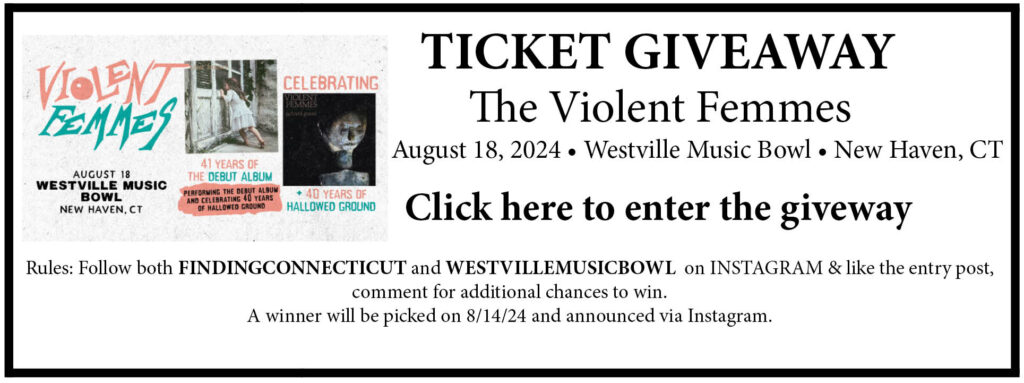
••••• Message center •••••••
Connecticut business owners:
Connecticut with us! Are you a local business owner in Connecticut looking to boost your visibility and reach more customers? Look no further! Our platform provides a unique opportunity to showcase your business to an engaged audience of people who love and live in Connecticut. By partnering with us, you can reach potential customers who are actively seeking things to do, places to dine, and local merchants and service providers to support. Don’t miss out on this chance to grow your business and connect with the local community!
Connecticut with us!
Get our news straight into your inbox daily for free!
Stay connected with us on social media
Facebook • Instagram • Threads • Tiktok • X
Join our Reddit community
Share your Connecticut experiences with us by using #findingconnecticut on Instagram
Click here to return to Finding Connecticut’s home page
Looking for the latest news by region, topic and events
Latest news by region
Fairfield County • Hartford County • Litchfield County • Middlesex County • New Haven County • New London County• Tolland County • Windham County
Latest sports news by team
Hartford Wolf Pack • Hartford Yard Goats • Connecticut Sun • Norwich Sea Unicorns •
2024 schedules
Hartford Wolf Pack • Hartford Yard Goats • Connecticut Sun • Norwich Sea Unicorns
Events my region
Fairfield County • Hartford County • Litchfield County • New Haven County • New London County • Middlesex County • Tolland County • Windham County
Events by interest
Art • Sports • Family Friendly • History • Concerts • Farmers’ Markets
Events by the month
May 2024 • June 2024 • July 2024 • August 2024 • September 2024 • October 2024 • November 2024 • December 2024
Events by venue
College Street Music Hall • Space Ballroom • Westville Music Bowl • District Music Hall • Hartford Stage • The Bushnell • Goodspeed Opera House • Mohegan Sun